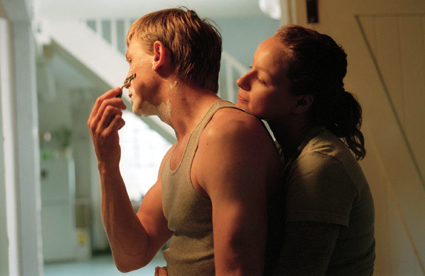

Reviews of Recent Independent, Foreign, & Documentary Films in Theaters and DVD/Home Video
Directed by: Roger Michell. Produced by: Kevin Loader. Written by: Joe Penhall, based on the novel by Ian McEwan. Director of Photography: Haris Zambarloukos. Edited by: Nicolas Gaster. Music by: Jeremy Sams. Released by: Paramount Classics. Country of Origin: UK. 100 min. Rated: R. With: Daniel Craig, Rhys Ifans, Samantha Morton, Bill Nighy & Helen McCrory.
In one of the year’s most riveting opening sequences, Joe (Daniel Craig) and Claire’s champagne picnic is interrupted by a freak accident. The attempt by Joe and other
by-standers to stabilize a downed hot-air balloon with a young boy in the basket spirals into a
deadly disaster. Part of what will trouble Joe is survivor’s guilt, but what really sets him on edge
is Jed (Rhys Ifans), one of the would-be Good Samaritans. He phones Joe and asks to meet him
to talk about the incident. Reluctantly, he does so and is bewildered when Jed confesses that he
feels a connection with Joe (or Jojo, as Jed immediately nicknames him). Next, the
shaggy-haired, bony Jed begins to follow Joe about London, quietly pleading that God has
brought them together. The film could be described as a male Fatal Attraction, except this
film is less concerned with shocks and thrills than with the disintegration of Joe’s confidence and
his relationship with Claire (Samantha Morton). This is not to say it’s without suspense.
The novel upon which it is based is told from Joe’s point of view. Unfortunately, the film
is not quite successful in conveying his interior monologues. On film, Joe’s thoughts and actions
are more of a puzzle. Here, he’s shell-shocked, almost frozen in action (as is the film’s
momentum in the second half). The viewer will probably feel more sympathy for Claire, mainly
because of Morton’s restrained performance. One could easily forget Claire is judgmental and
not entirely supportive of Joe either after the catastrophe or during the stalking.
Novelist Ian McEwan’s elegant prose is replaced here with awkward
pseudo-philosophical exchanges of the nature of love. And there is no way to avoid the
homophobia. Jed, the “gay Jesus Freak” as he’s described in the book, becomes physically
threatening, and a woman, naturally, bears the brunt of his anger. The acting is so convincing,
however, that this could be overlooked. In the film’s final act, the camera heavy-handedly echoes Joe’s
state of mind - with shots from askew angles and frenetic editing. One wishes the camera would stay planted and
simply focus on the ensemble. With actors this compelling,
the camouflage isn’t as effective or necessary. Kent Turner
|